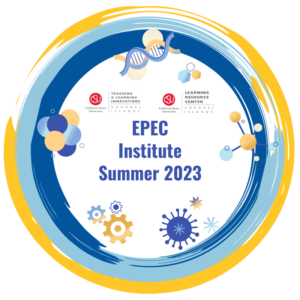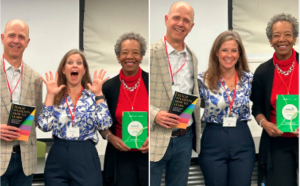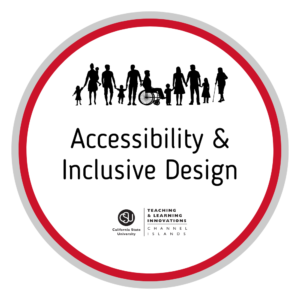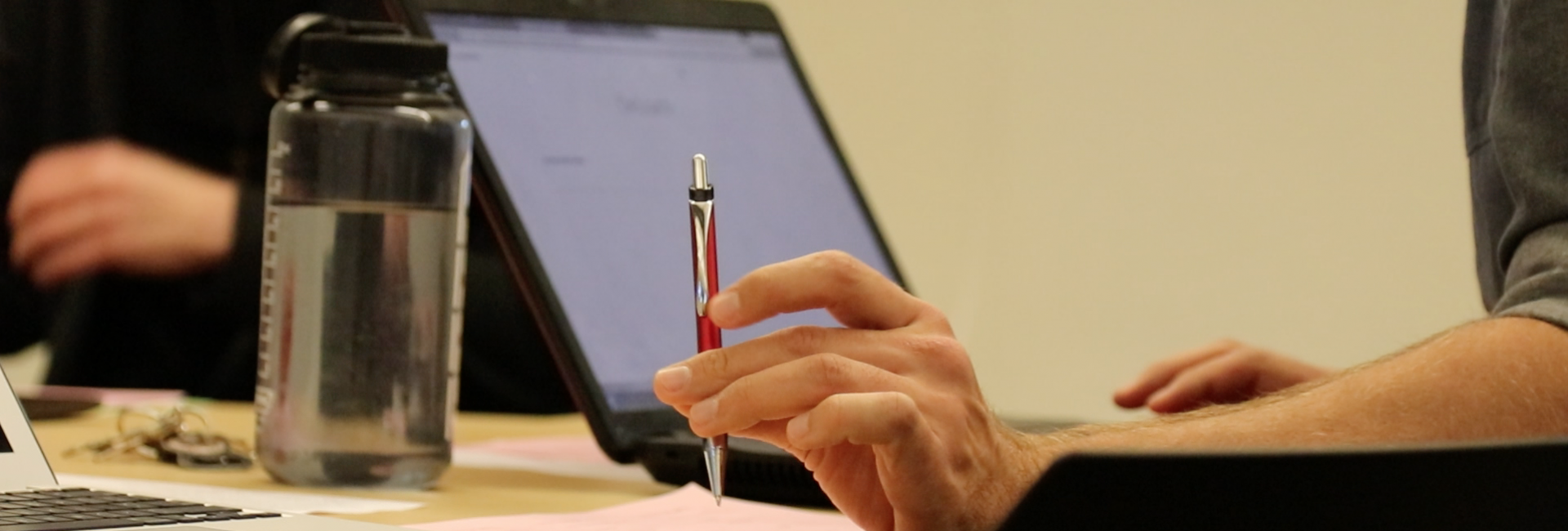Small Teaching Innovations
Learning Design Faculty Projects
With many faculty development efforts targeting specific programs with high DFWI rates, we found many faculty were already engaged in long-term programming with minimal capacity to participate in additional programming. Therefore, we sought to offer a “small” incentive to create an opportunity for faculty who wished to implement a small innovative change with both the autonomy and support network to design, develop, and implement a “small teaching innovation” using one of four learning technologies: a) Canvas Badges; b) PlayPosit; c) VoiceThread; and, d) Hypothes.is. Projects must align with QLT Criteria 3.3 and 3.5 with the selection of three additional criteria from 4.3, 4.4, 4.5, 4.6, 5.2., 5.3, 5.4, 5.5, 5.9. and connect to a campus strategic goal or initiative.
Steps are summarized in the Faculty Recipient Guide and explained on the Learning Design Project Website:
- Submitting a Proposal
- Meeting with a TLi Consultant for a Pre-Project Plan Consultation
- Developing a Detailed Project Plan (template provided)
- Developing the project in a Canvas Course
- Submitting their project as an exemplar to QuARRy
Outcomes:
- 12 Proposals accepted and projects are underway
- 11 Projects integrated into Health Science, English, Mechatronics, Psychology, Library Research, Business, Spanish, Arabic, Communication, and Early Childhood Studies
- 9 CSUCI Exemplars submitted and accepted to QuARRy for QLT Sections 3, 4, and/or 5
Faculty QuARRy Exemplars:
Using PlayPosit
- Breeann Austin, Library
- Argero Zerr, Psychology
- Regan Bynder, Early Childhood Studies (ECS)
- Hyunsook Youn, Communication
- Vida Vakilian, Computer Science
Using VoiceThread
Using Canvas Badges
PlayPosit STEM Blog & Webinar Series
PlayPosit STEM focused Blog & Workshop Series. We are fortunate to welcome Georgia Van Tyne to our team as of November 2022 as a learning designer. With her STEM background she has expanded our team’s capacity to target learning technologies in a way that support quantitative reasoning courses, all of which are the focus on multiple campus initiatives to reduce DFWI rates in B4 courses to improve freshman retention term to term and by extension, degree completion (GI 2025 targets). Georgia has developed and is currently offering a STEM focused blog and webinar series that situates the use of PlayPosit to provide high structure asynchronous engagement specific to Quantitative reasoning courses. Her blogs are included below. PlayPosit was so impressed with her work, they have featured her efforts and CSUCI in their April Newsletter.
- Engaging Students in STEM: Interactive Videos with PlayPosit
- Engaging Students in STEM: Interactive Digital Worksheets with PlayPosit
- Engaging Students in STEM: PlayPosit Analytics to Support Continuous Improvement
Interest Groups
Spring 2023 Pedagogy/TechnologyInterest Groups (CIGs) hosted by TLi
To foster discourse and sharing, TLi hosted four Pedagogy/Technology Interest Group Sessions. Spring events include:
Interdisciplinary Partnerships for Student Success
Consistent with our belief that quality teaching and learning is the result of interdisciplinary and cross-campus partnerships, Digital Learning continues to collaborate with other stakeholders to support student success. Projects and Events are summarized below.
Embedded Peer Educator Collaboration (EPEC) Faculty & Learning Center Professional Institute
Launched Summer 2022 in collaboration with the Learning Resource Center(LRC) Director Brook Masters, TLi Learning Design co-developed and co-facilitated a multimodal and flexible professional learning experience to prepare faculty to integrate an embedded peer educators (EPE) into their course design and instructional approaches as an intervention to address 100 and 200 level courses with historically high DFWI rates. EPEC 2023 has expanded to include 4 additional CSU Campuses and has expanded its curriculum to include Learning Center Professionals (i.e. directors/leaders of learning centers). EPEC supports in-person, virtual, and asynchronous participation through a hyflex Launch Day, followed by five asynchronous modules, weekly and monthly optional Zoom chats, and concludes with two virtual half-days.
Masters, TLi Learning Design co-developed and co-facilitated a multimodal and flexible professional learning experience to prepare faculty to integrate an embedded peer educators (EPE) into their course design and instructional approaches as an intervention to address 100 and 200 level courses with historically high DFWI rates. EPEC 2023 has expanded to include 4 additional CSU Campuses and has expanded its curriculum to include Learning Center Professionals (i.e. directors/leaders of learning centers). EPEC supports in-person, virtual, and asynchronous participation through a hyflex Launch Day, followed by five asynchronous modules, weekly and monthly optional Zoom chats, and concludes with two virtual half-days.
Key Note Guest Experts:

- Dr. James Lang (2023 & 2024)
- Dr. Saundra Yancy McGuire (2022, 2023 & 2024)
- Dr. David Arendale (2022)
Program Details

What is EPEC?
For a snapshot of EPEC and what takes place, please read our Blog about the 2023 Launch Day!
Curriculum:
- Core Read 1: James Lang, Ph.D.’s Small Teaching: Everyday Lessons from the Science of Learning, 2nd Edition. Each module we will identify the chapters in Dr. Lang's book that pairs with the module topic.
- Core Read 2: Dr. Saundra McGuire's, Teach Students How to Learn. Each module we will identify the chapters in Dr. McGuire's book that pair with the module topic. CSUCI EPEs have the student version of the book and are trained in implementing these strategies when working with students.
- Recommended Courses and Activities in OneHE
For a program overview, please review the Summer 2023 EPEC Syllabus
Summer 2022 by the Numbers

- 14 CSUCI Faculty Completers
- 7 Disciplines Represented: Biology; Chemistry; Computer Science; Math; Sociology; Psychology; Physics
- Summer 2022 Completion Badge
Summer 2023 by the Numbers
- 5 CSU Campuses: CSUCI; Cal State LA; Chico State; Sac State, and Sonoma
- 17 CSUCI Faculty Participants
- 4 Non-CI Faculty Participants
- 6 Non-CI Learning Center Professionals
- 7 Disciplines Represented: Biology; Chemistry; Computer Science; Math (Stats & Pre-Calculus); Psychology; Physics; English
- Summer 2023 Faculty Completion Badge
- Summer 2023 Learning Center Professional Completion Badge
Writing and Multiliteracy Center (WMC) On Demand
Learning Design continues to partner with the Writing and Multiliteracy Center to develop asynchronous on-demand workshops utilizing Canvas, Playposit, and Badgr. To support the need for flexible multimodal learning, and with only two full-time staff, expand WMCs capacity to support students, together we have developed and piloted three workshops students can complete asynchronously:
- Online Oral Presentation
- APA Citation
- General Literature Review
Students earn a digital badge upon completing each workshop and submit their badge to their instructor as evidence of completion. Below are the badges and how many of each badge have been issued during the pilot. To date, a total of 220 badges have been awarded. During 2022-2023 we updated the badging interface to Canvas Badges enabling students to submit a link to their badge as evidence of workshop completion. Three more workshops are in the pilot phase for release during AY 2023-2024.
Completion by the Numbers
Badges Awarded by Workshop
- Online Oral Presentation = 352
- APA Citation 7th Edition = 463
- General Literature Review = 113
Total Badges Awarded: 928
Supporting Accessibility & Inclusive Design
Accessibility & Inclusive Design (A.I.D.) How-To-Guides

Kristi O’Neil-Gonzalez, Accessibility Lead, developed guides for our TLi Knowledge Base specific to Accessibility and Inclusivity to aid instructions in developing more accessible digital content including documents, media, and formatting within the LMS. To increase campus awareness and knowledge, she is also partnering with the DASS Facutly Liason to host "Silent A Sessions" and "Listening Circles."
A.I.D. By the Numbers:
- 4 'Silent A' Support Sessions
- 27 Accessibility & Inclusive Design Consults
- ALLY in CI Learn
- Inclusive CI Docs
- Inclusive Graphics & Multimedia
- Inclusive Text Formatting
- With Inclusive Design in Mind
Learning Online 101
Originally launched in Fall 2018, Learning Online 101, a free self-paced course that students can complete in approximately 1-3 to orient them with the technical tools, mindset, and executive function skills necessary for success in an online or multimodal course. Learning Online 101 was designed to reveal the "hidden rules" for being successful as an online student such as time management and setting up a schedule to ensure students know how to stay on track so they can enjoy the flexibility of being online while being a successful independent learner.
AY 2023-2024 we look forward to update Learning Online 101 with a new module specific to mobile learning!
Learning Online 101 by the Numbers
- 9,513 Badges Issues to CSUCI Students
- 95 Course Copies shared with a CC-BY-NC-SA license to institutions nationally and internationally
Resources






